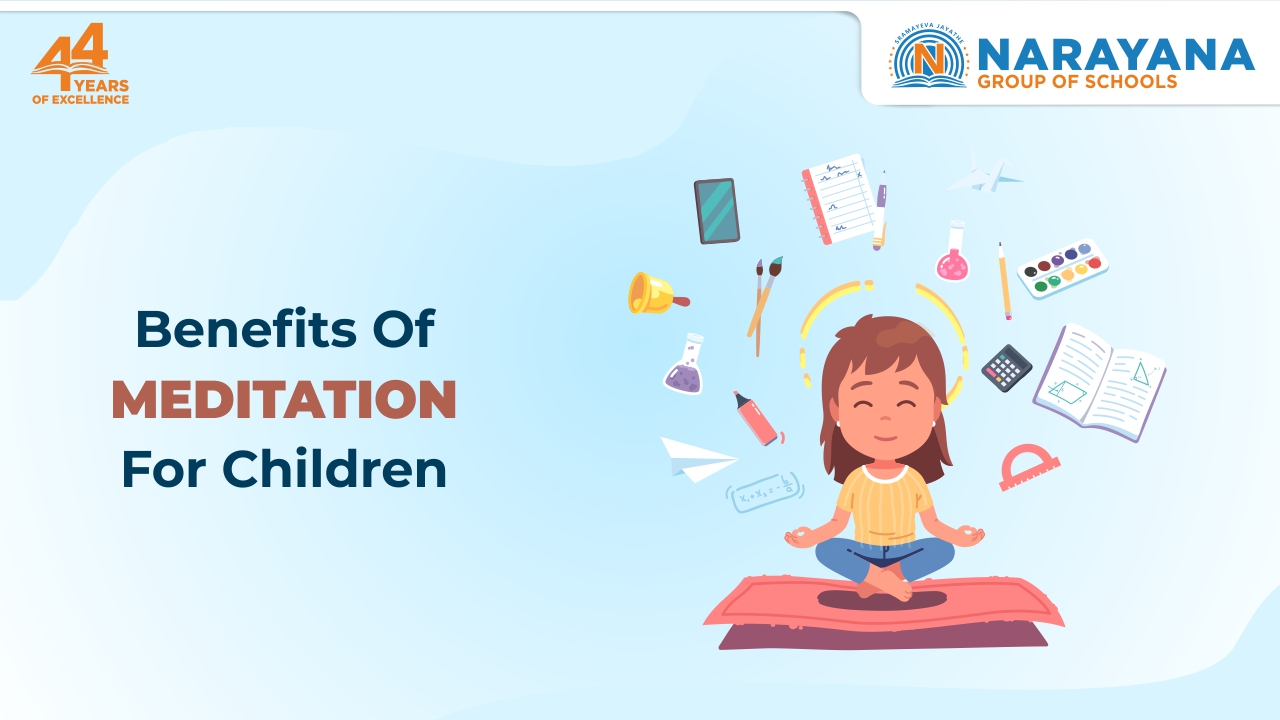Benefits of Meditation for Children
Gautam Buddha once said, “If you are quiet enough, you will hear the flow of the universe. You will feel its rhythm. Go with this flow. Happiness lies ahead. Meditation is key”
Meditation is a spiritual exercise that helps people achieve a sense of calm. This centuries-old practice benefits people of all ages and takes on even more importance in the stressful lives of children. A bright intellect hampered by inactivity often results in stiffness, tension, rage, and irritation, and so, yoga assists the students in bringing about perfection by balancing the mind and body.
‘The greatest thing in the world is to know how to belong to oneself.’, said Michel de Montaign.
Even though meditation is as easy as breathing, it requires conscious effort to take a moment and give oneself the time one needs to examine who they are, especially when there’s a lot of pressure from the outside world.
So, to highlight the importance of yoga and meditation for children, we bring you some amazing benefits of the same:
Increased Focus:
According to studies, the cognitive functioning of regular meditators improves tremendously. Meditators are less prone to being the prey of distractions and a disorderly mind. Meditation for children is known to relieve stress, tension, and ADHD symptoms. Consequently, the ability to concentrate on the task at hand increases, as do brain processing and linguistic skills.
Improved Productivity in the Classroom and Scholastic Results:
It is apparent that improved academic achievement is a positive side effect of being more focused. Students who practice meditation regularly tend to have a clear mind, can manage their tasks, and operate around deadlines more successfully, providing them with adequate time to study. As a benefit of yoga and meditation, learners can easily recognize their weak spots, which leads them to bridge the gaps and perform better on the academic front.
Increased Confidence and Self-Worth:
Learning about oneself is a direct result of regular meditation practice. Because of this gradual acceptance, one’s sense of self-worth and confidence grows. Meditation for children is an activity that provides them with insights into their own personal barriers and equips them with strategies to make their way through the same.
Meditation strengthens one’s ability to remain in the present moment. A student’s level of self-confidence frequently improves their capacity to make the most of their time and resources.
Healthy and Fulfilling Relationships:
Having confidence in oneself and the insight to comprehend one’s emotions in various situations makes it simpler to manage a wide variety of relationships. Along with other regular self-improvement practices, meditation is a powerful catalyst for positive change. One of the numerous benefits of meditation is that it enhances one’s capacity for expression. The practice of meditation has also been demonstrated to improve children’s ability to hear and accept information easily, leading to the development of healthy relationships with family, friends, and teachers.
Improved Discipline and Stability:
Beginning the day with a meditation session helps one get in the right frame of mind and make the most of it. Meditation brings a flux of energy by helping students get through the day despite the exhausting study schedule. Meditation for children has been shown to alter brain structure irreversibly by creating new neural pathways and routines. By reducing mental clutter, children make more informed and secure choices, which helps bring stability to their lives.
Monitoring one’s thoughts closely via meditation increases one’s sense of presence, tranquilly, and attention, as well as ensuring the development of desirable human attributes such as empathy and patience. Hence, the benefits of yoga and meditation contain huge gravity and must be practiced more often by children.
So, all the students out there, go easy and gift yourself this art of meditation.
